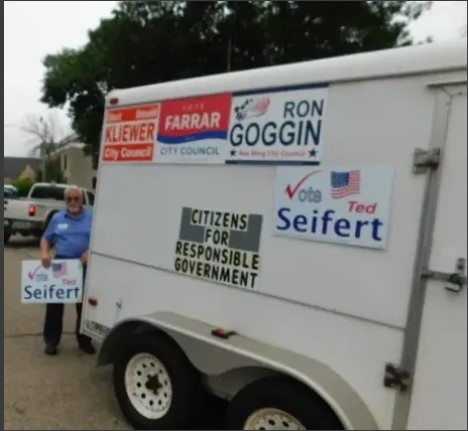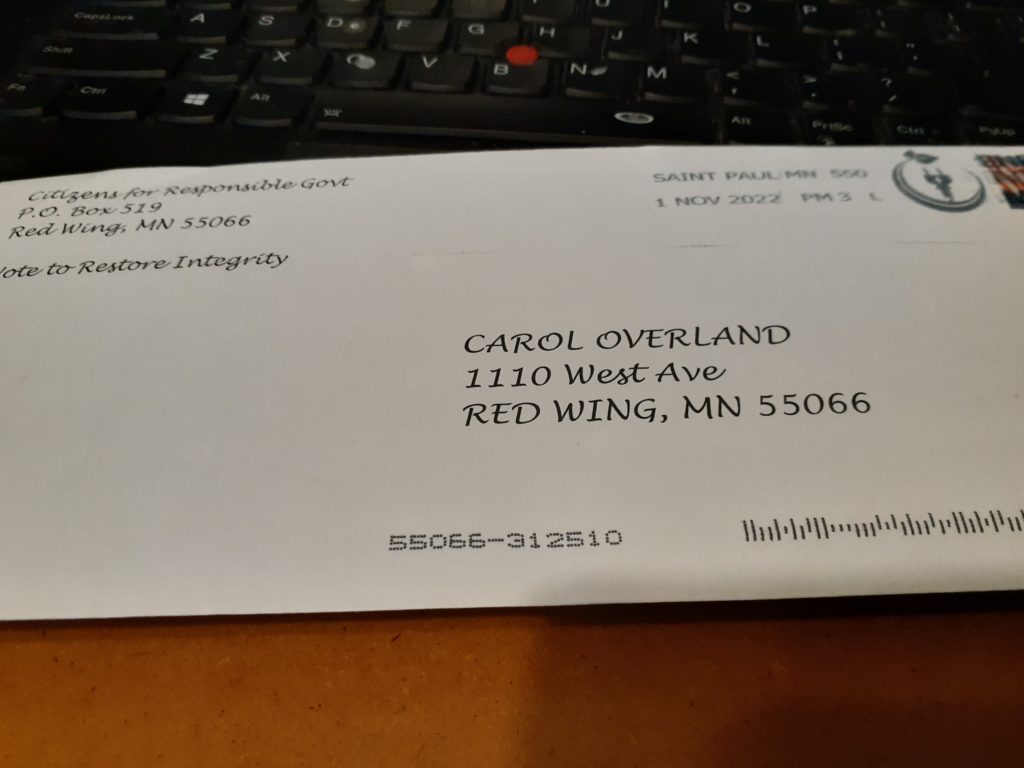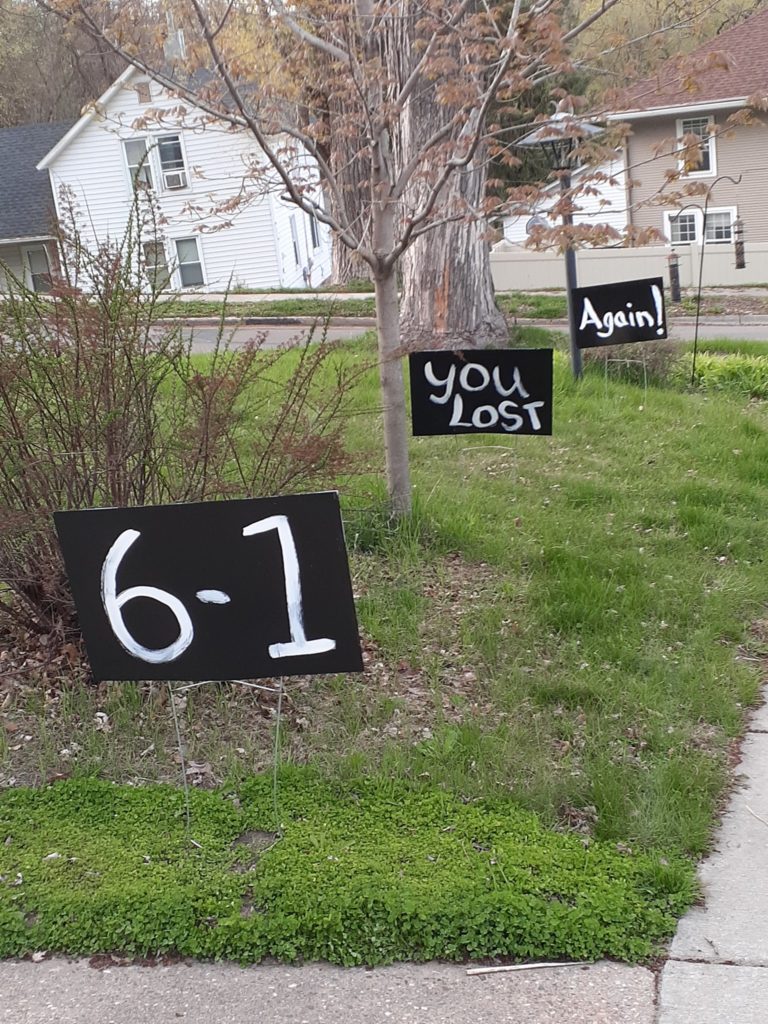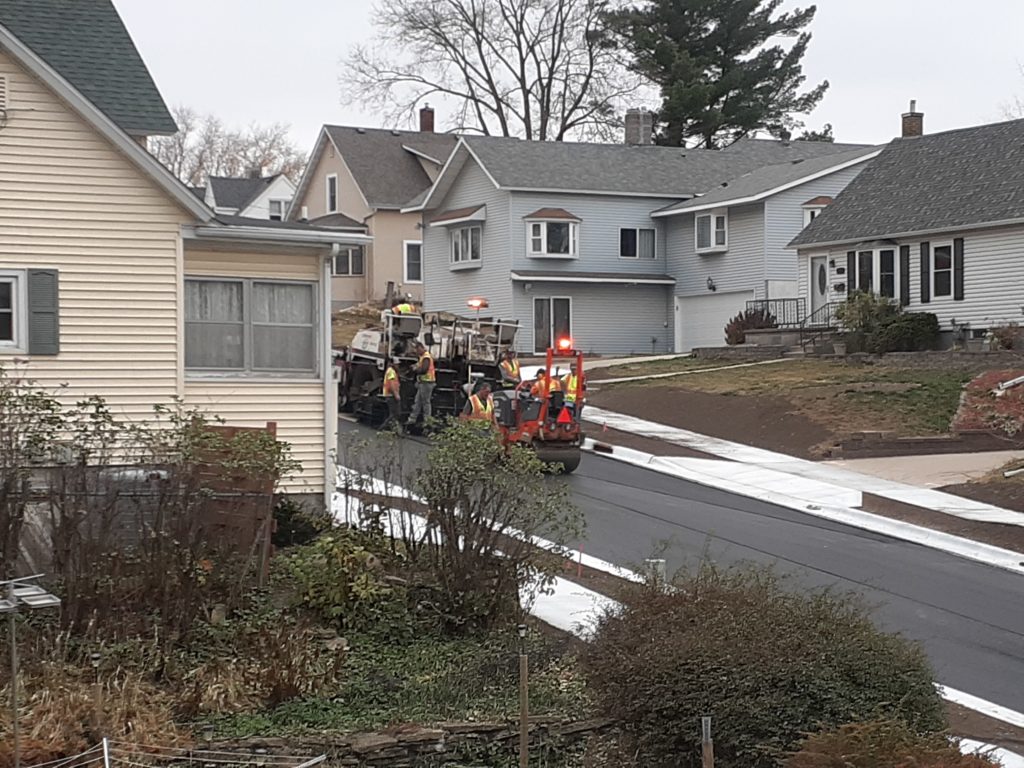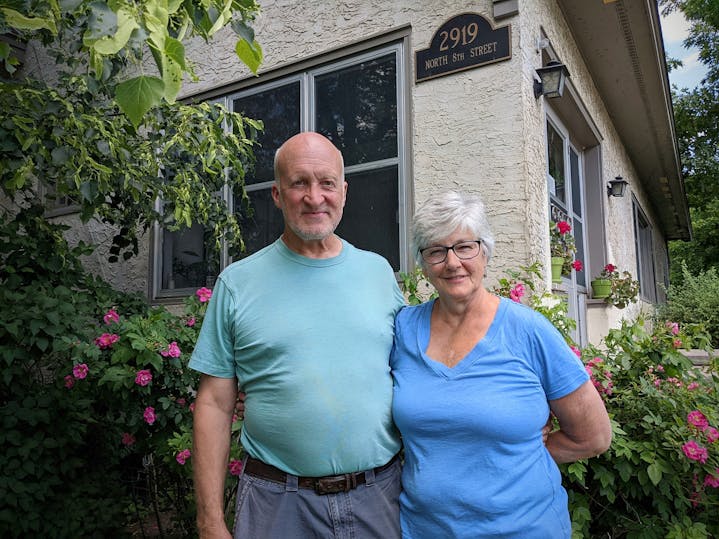Campaign coordination, $5,593.63 MIA from Recall City Hall, and more!
November 6th, 2022
Check out their financial reports. Are these the people you want responsible for City finances?
Some of those who were leading the Red Wing “Recall City Hall” campaign are now running for City Council. Ron Goggin (Wards 1 & 2), Jason Snyder (Ward 3), Ted Seifert (Ward 4), and Janie Farrar (At Large) are running as a bloc in this election cycle — Don Kliewer (Ward 2) won the open seat earlier this year — and as above, you can see they all have been working together:
Candidates for City Council… Recall City Hall… candidates in parade with trailer labeled “Citizens for Responsible Government” and the truck pulling it belongs to ??? Jason Snyder??? Flyer sent around to many in Red Wing by “Citizens for Responsible Government” — as we say in transmission, “it’s all connected.”
How many of the same people are involved in all of these efforts? How many are wearing many hats, and just who is wearing whose hat? How closely were they working together? Look who was funding the Recall efforts! (Campaign Reports – Recall City Hall) Look at the 5 signers sponsoring the Petitions, and look who walked the petitions around and signed Affidavits! (Recall Petitions here! and “Dean Hove 2” Recall Petitions). Look at the candidates, their treasurers, and monetary and in-kind donors for both candidates and Recall.
What about “Citizens for Responsible Government,” the name on the trailer in the parade leading the candidates, festooned with all the candidate signs, and “producer” of that cheesy-but-expensive-to-mail flyer that just landed across the city? The flyer makes wild presumptions, misstatements, and demonstrably false claims, and does not cite to sources for claims made. At the bottom, it states it was written and produced “without any candidate involvement or endorsement” — though the evidence strongly suggests otherwise. Look at the photos above! Look at how the language of the flyer below parrots the points and language of the Recall City Hall page (scrubbed but available via Wayback):
Neither the Red Wing “Citizens for Responsible Govt” nor “Citizens for Responsible Government” are registered as a Committee or fund nor are registered with the Secretary of State. They are for sure not related to the legit “Citizens for Responsible Government” reporting to the Campaign Finance Board, registered as a 302A business corporation, and run by known DFLers in north metro!
Here are the bloc Red Wing City Council candidates Campaign Financial Reports and the Recall City Hall Reports (including documentation of missing $5,569.96 as of November 2021, grown to $5,593.63 as of August 10, 2022), plus photos of candidates and the “Citizens for Responsible Government” trailer, plastered with all of their campaign signs, parading through Red Wing (parade spot paid for by Recall City Hall on July 19, 2022, long after recall over). SEE FOR YOURSELF! (The blue ink comments, circles and arrows, and the orange and yellow highlighting are mine):
If you see any math errors let me know, as I’m at the 46 percentile in math, and though I’ve checked and rechecked, errors can happen — and I’ll correct pronto.
Note: In the Candidate Campaign Financial Report, they’re spending money, more than they’re taking in, with no explanation. What money are they spending? Where did that money they’ve reported spending come from??
Note: The Recall campaign report of November 2021 shows that $5,569.96 disappeared in November, 2021, and it’s up just a bit to $5,593.62 in the August, 2022 report. Where did that money go?
Note: The Recall campaign filed “Amended” reports after I’d pointed out irregularities in its first two reports. The Recall City Hall campaign reports are beyond irregular, and the missing $5,593.62 as of the committee’s August 2022 report is a major issue yet to be corrected.
Note: The Recall City Hall campaign paid for a $300 River City Days parade spot on July 19, 2022 despite the recall effort ending in August nearly a year before! Note also that none of the candidates marching with “Citizens for Responsible Government” paid to be in the parade line-up, and there was no identified “Recall City Hall” contingent. Sure looks, parades, and quacks like a coordinated duck!

Given the connections between the Recall City Hall and the candidates, the ties of candidates to “Citizens for Responsible Government”/”Citizens for Responsible Govt” and a review of their financial filings, what do you think? Is this an example of fiscal responsibility?
- The reports filed are missing much information.
- The numbers on the reports don’t add up.
- Where, when, and how did Recall City Hall’s $5,593.63 disappear?
- Where did the candidates’ get the money state they are spending when it’s a lot more than they report taking in?
- Is there a connection between Recall City Hall money disappearing and candidate money “not received” being spent by campaigns?
- Did Recall City Hall pay for the parade line-up spot used by the candidates AND “Citizens for Responsible Government” at River City Days?
- Where they’re all connected, is it plausible that they’re not coordinating their efforts?
WITH THESE CAMPAIGN FINANCIAL REPORTS, DO THE CANDIDATES DISPLAY THE LEVEL OF FIDUCIARY RESPONSIBILITY NECESSARY TO MAKE FINANCIAL DECISIONS FOR THE CITY OF RED WING?
THROUGH THEIR ACTIONS, DO THE CANDIDATES DISPLAY THE INDEPENDENCE OF MIND AND CRITICAL THOUGHT NECESSARY TO CONSIDER A RANGE OF VIEWPOINTS AND EQUITABLY REPRESENT CONSTITUENTS?
You can find all their campaign reports as filed here on the City page:
2022 Campaign Reports – Red Wing City Council
Here are the Recall City Hall campaign finance reports, also on the City page:
Campaign Reports – Recall City Hall
Ask the candidates about their reporting! Let them know what you think!
Red Wing “Recall City Hall” yahoos are at it again
November 3rd, 2022
UPDATED!
Just received in the mail (some were received yesterday), a letter at full postage, not even bulk mail or a post card, and one to Alan, one to me, many other households received to as well, so it’s expensive, and requires a Campaign Finance Report! Let’s see it.
Independent expenditure? No coordination? Right Ted Seifert:
“Citizens for Responsible Government” and Goggin, Seifert, Kliewer coordinating — where’s Janie?!?!
Envelopes sent at full price postage to many — expensive enough to require filing as Committee? I’ll bet it is! Reports were due October 31.
No report found yet.
Once again, we have the “Little Lie” patterned after the BIG LIE. Compare the language of the flyer below with that on their website. What, it’s gone? Not to worry, the internet is forever. Look at the Recall City Hall website via wayback:
Recall City Hall
Here’s what they sent:
If you’re bitchin’ & kvechin’ about budget, “fiscal responsibility” and spending, why are you not showing up at Budget Workshops and letting Council and staff know how you think it should be done? If you don’t show up now, would you show up if elected?
Get over it — you lost!
City of Red Wing 2023 Budget
October 26th, 2022
It’s that time of year again…
Lots to review, the budget is no small thing! This is the City’s Budget page, which will be updated before and after meetings:
2023 Budget Planning
From the August 29, 2022 meeting, primary docs:
Purpose of the August 29, 2022, City Council Budget Workshop
The purpose of the budget workshop is to further discuss the 2023 levy and review Special Revenue funds.
Other primary documents for consideration:
City infrastructure assessments – how and why?
October 24th, 2022
UPDATE: After commenting at last night’s meeting, and the missive below, Council Pres. Becky Norton requested staff to provide update to Council of 1) how city assessment process works; and 2) how other cities handle assessments. Now, to make sure that this is a public process and affected folks are asked to weigh in.
Just sent the Red Wing Mayor and City Council another missive about public infrastructure assessments by the City (spurred by the STrib article today, below):
All –
The good news is that Sturtevant’s first layer of asphalt is down! YEAAA! Seeding is done, and we’ll see what happens next spring. They also poured a little retaining wall by our day lilies at the corner:
No question that this Sturtevant redo was LONG overdue. Infrastructure improvements are good for the city, it’s INVESTMENT in community, job creation, and like the West Main project and the bridge, the levee upgrade for more of the big boats, and bike trails, it’s all economic development which we sorely need, investments that make it easier to get around and more attractive for business.
Assessments are another matter… Yes, another issue for the Mayor and City Council (Thanks to Dean, and Becky too, and Ryan Illa, for responding on the Sturtevant and West U.S. mail non-delivery issue. No response from our new W-2 Councilor Kliewer, perhaps isn’t getting his mail either?. We still have no mail delivery, despite sidewalks done for a week now):
City streets and sidewalks and sewer and water are used by everyone, it’s public infrastructure. Recognizing that street assessments are only an apportioned percentage of the full cost, it’s still too much for individual property owners. It’s an inherently unfair, inequitable way of covering these costs for public infrastructure improvements.
At the outset, I recognize that the assessment reflects an apportioned cost, based on property footage (not market value of property as it is in some other jurisdictions), and that cost that is apportioned to property owners is not the full cost of the project, but a percentage of the project cost (25%? Apologies, Marshall, I’ve forgotten that %!). I also recognize that there is funding from other sources; for the Great West Wall, there was federal funding, and for Sturtevant I’d guess there’s state funding, and it’s my belief that the LGA and other state funding to cities has been at least partially restored. What percentages of this Sturtevant project are paid by state or other sources? Whatever the % apportioned and assessed, I’m not requesting that the % assessed to individual property owners be lowered.
My take is that assessments for public infrastructure, because it is PUBLIC infrastructure, should be spread across the entire base of property owners in the City, residential, commercial, and industrial, and yes, even non-profit-owned property.
My request is that the city rethink how it assesses for public infrastructure improvements, and that this be considered in a public way, soliciting comments from landowners (we have a project list, so it’d be easy to contact those affected by this Sturtevant project). Public engagement, eh?
How much of an assessment for the Sturtevant project? For example, our assessment for Sturtevant, coming on the heels of the Great West Wall assessment, is expected to be $5k+ (and an additional $5,500 for new sewer and water connecting to the city’s at the sidewalk). That’s $11,000, and that’s a lot for any of us along Sturtevant. That $11k is twice the cost of our van and car! I have the advantage of being able to work until I drop and we have nominal savings to cover the cost. I don’t think that most of my neighbors have this privilege. Financing that cost is no solution. The City should not be in the business of charging interest on assessments that are inequitable from the get-go. (And that’s another issue… The interest rates are beyond market rate, and although it’s been lowered, this is something the City considers annually, and this needs to be more public, with notice to upcoming landowners who would be charged those rates on assessments. The City knows who these landowners are.)
How did people along West cover that cost? How will the folks along Sturtevant pay for it? Can you cough up $5,000 plus for an assessment and $5,000 plus for private connections? If you can, recognize that you are privileged. The fundamental issue here is one of equity — should individual property owners be required to pay for public infrastructure adjacent to their property? Why shouldn’t payment for public infrastructure be paid for by the public, the apportioned amount apportioned more broadly to reduce the individual impact? Though you may not be hearing from others, I’m not the only one struggling here, but I’m the professional advocate on the street, the one used to speaking up. Let it be known that this is a stretch for the working families on Sturtevant for whom the assessment constitutes one or more month’s gross income. This is a major financial burden for those of us along the street.
Again, my request is that the city rethink how it assesses for public infrastructure improvements, and that this be considered in a public way, soliciting comments from landowners.
Thanks for your consideration.
Carol
+++++++++++++++++++++++++++++++++++++++++++++++++++++++++++++
Minnesota street projects often are funded by hefty assessments. But is that fair or legal?
St. Cloud grapples with an issue that other cities have been addressing.
By Jenny Berg Star Tribune October 23, 2022 — 5:00pm
Jenny Berg, Star Tribune Kevin and Julianna Carpenter sued the city of St. Cloud after being assessed nearly $14,000 for road improvements near their home. After the city appraised the house, it lowered the assessment to about $4,000.
ST. CLOUD — Mary Hall got an unexpected $6,300 bill from the city three years ago. It was her share of the neighborhood project to resurface the road and replace underground utilities.
Hall thought the city was charging too much based on what her neighbor told her about state law: that a city can’t assess someone for more than their property value increases due to project improvements. But her husband had just died and she didn’t have the heart to fight City Hall.
Meanwhile, Hall’s neighbors Kevin and Julianna Carpenter sued the city in district court, and the city ultimately lowered the Carpenters’ $14,000 bill to $4,000. So the Carpenters — who live in a historic $330,000 house — paid less than the widow in her $100,000 house for the same road project.
“How does the city possibly think that’s fair?” asked Kevin Carpenter, a retired lawyer who is trying to get the city — or state — to change how it assesses property owners. Carpenter has spent hundreds of hours tackling the issue with city staff and through the state court system.
Cities around the state routinely charge property owners for improvements to roads and sidewalks. But in the past few years, a number of cities — including Duluth, Rochester, Edina and Northfield — have changed the way they pay for road projects in an effort to be more equitable and stay within the law.
Despite the state law, many cities do not consider market value at the front-end of a project. Instead, some cities, such as St. Cloud, assess property owners based on how many feet of the property touches the street being improved. Minnesota case law has determined this so-called “front footage” method is valid because it is a fair approximation of the market value increase.
Carpenter calls the policy regressive because it doesn’t take into account a homeowner’s income or ability to pay.
But St. Cloud City Administrator Matt Staehling argues special assessments are an important funding source that allow the city to obtain bonds to finance the street improvement projects.
What other cities are doing
“It’s an issue people care about. It’s hitting their pocketbooks,” said Tyler Niemeyer, assistant city engineer for Rochester, where a task force recently spent more than a year drawing up a new assessment policy. Now simple road resurfacing projects are funded through a tax levy instead of assessments. And larger projects proportion the cost based on people’s property values, resulting in assessments that likely will be lower than using the front footage method, Niemeyer said.
In Duluth, the city has entirely moved away from assessments for road projects, instead using proceeds from a sales tax that voters approved in 2017.
“We haven’t given up the ability to assess. We’re choosing not to at this time,” said City Engineer Cindy Voigt, who added it’s easier to manage the projects when residents “know they don’t have to pay for it on top of the dust, the dirt and the inconvenience.”
Northfield charges a gas and electric franchise fee that residents pay on their utility bill, which helps spread out the cost. An Edina task force spent eight months crafting a policy that transitions from funding road projects with assessments to funding projects with property taxes over about two decades. The Edina City Council approved the policy in July 2021.
“So instead of just the neighborhood paying for their streets, the entire city is paying for city streets,” said Chad Millner, engineering director for Edina.
Millner said the long transition is to placate residents upset after paying recent assessments. Their logic was, “I had to pay the fee so everyone else should, too,” Millner said. “We never solved the fairness problem.”
Burden is on property owners
Another complicating factor is that the onus is on residents to prove the assessment is greater than the increase to their property value.
So homeowners have to use time and resources to contest the assessment with the city and file a lawsuit in district court, which costs about $300.
“I don’t think the burden should be on the resident to know the back-channel law and have to fight it,” said Jason Theisen, a St. Cloud resident who fought his $16,500 assessment for a 2018 road project. “I think [the city] should just be following what the law is.”
Kevin Carpenter helped Jason and Kathryn Theisen filed an appeal in district court. The city then obtained an appraisal of their property and reduced their assessment to $5,000.
“In our opinion, the work needed to be done. Infrastructure is important. We had no issue paying something,” Jason Theisen said. “Just when we got the sticker shock of the initial amount, it was like, holy moly.”
After hearing Carpenter’s complaints about his assessment, longtime Council Member George Hontos asked city staff and other council members to consider simplifying the process for residents to re-examine their assessments before needing to go to court. But it never materialized.
“I just feel uncomfortable thinking [suing the city is] the only recourse,” Hontos said. “It just doesn’t seem to be user friendly or considerate of the residents.”
(rest of article here: https://www.startribune.com/minnesota-street-projects-often-are-funded-by-hefty-assessments-but-is-that-fair-or-legal/600218369/)
Recall? (SNORT!) NO! NO! NO!
April 24th, 2021


It’s a RECALL TO NOWHERE!
From the City: YOU ASK, WE ANSWER — What’s a Recall?
They’re out today, trying to gather signatures, handing out the above flyers. Earlier this week there was a long advertisement for the recall effort:
Red Wing recall movement hits the streets for signatures
And some great Letters to the Editor in today’s bEagle – click for larger version:


“Pathetic malcontents” pretty much says it all.
My $0.02:


Note that the recall petitions they’re trotting around only complain of open meeting law violations (click for larger version):

When they say “by voting unlawfully to deny an open City Council session for consideration disciplinary action against Chief Roger Pohlman, thus infringing upon the rights of the public…” it seems to me that what they wanted was a open IN PERSON meeting at City Hall, so they could storm City Hall!
Pohlman had a “name clearing” hearing, and here’s what it looked like outside City Hall — is there anyone under 50 in this sparse under-50 group:

These are the initial flyers about the recall:
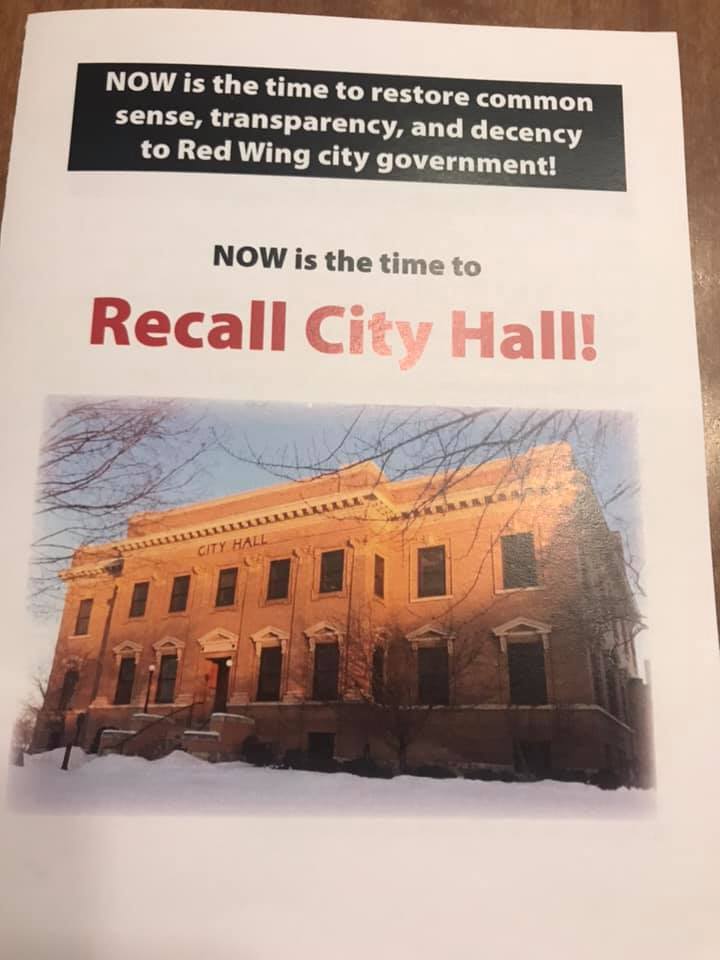

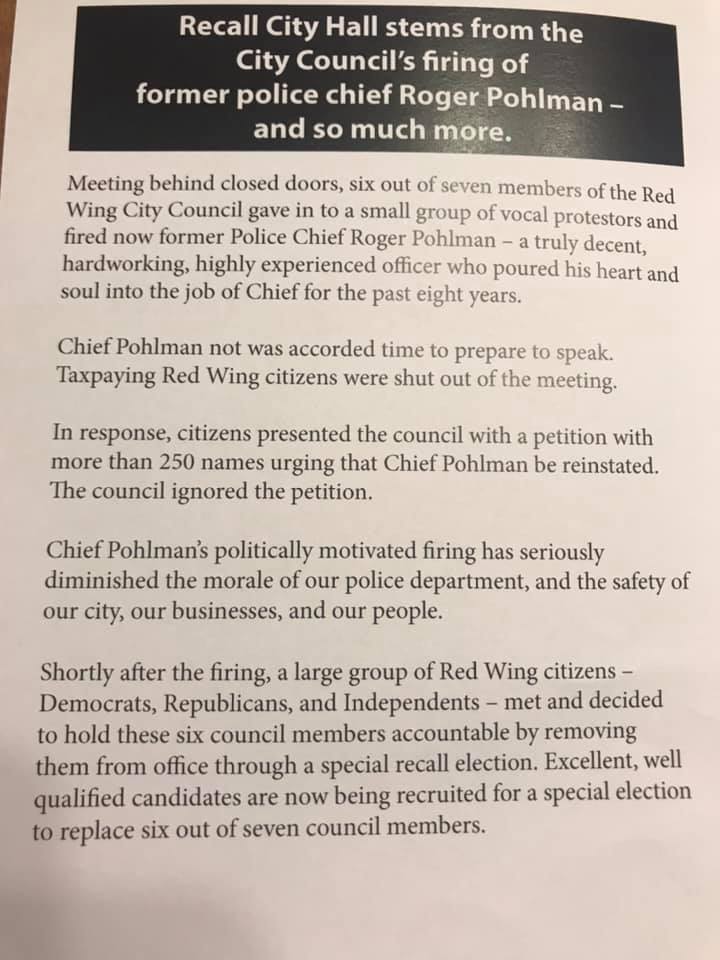
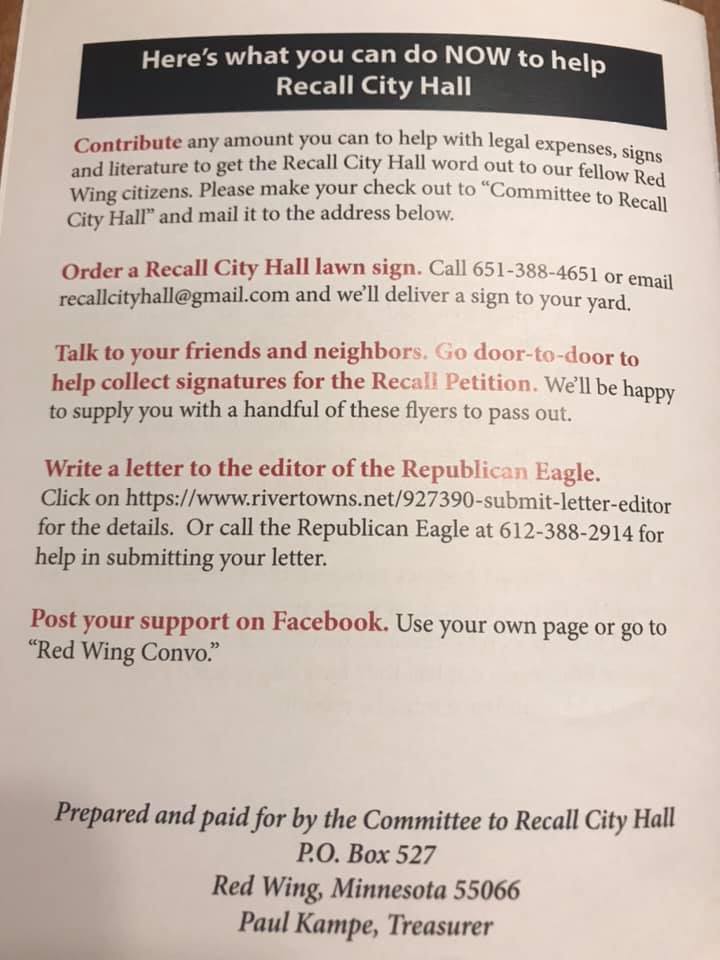
And then there’s the ~250 “Petition” that had typed names, no signatures, people living outside of Red Wing and even in Wisconsin!! Several have complained that their name was used improperly.



And some more primary documentation — the initial campaign report with significant LARGE anonymous donations:
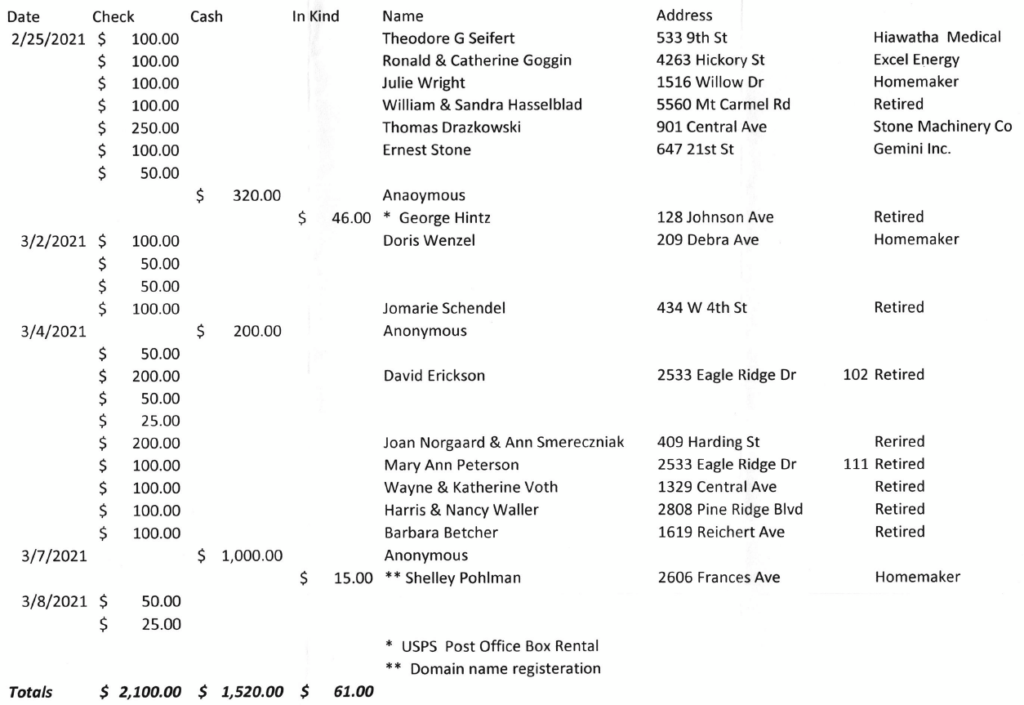
Here are the reports, initial and “amended.” SNORT!

